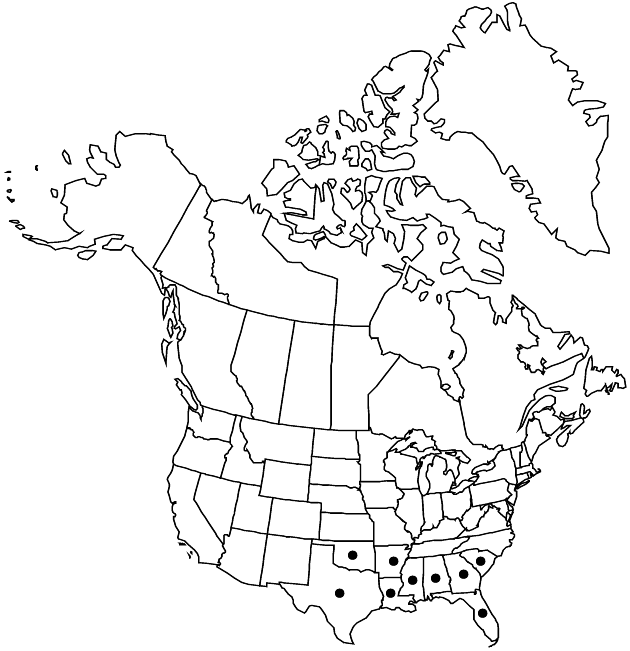Difference between revisions of "Liatris elegans"
Fl. Bor.-Amer. 2: 91. 1803.
FNA>Volume Importer |
FNA>Volume Importer |
||
| Line 25: | Line 25: | ||
|distribution=s United States. | |distribution=s United States. | ||
|discussion=<p>Varieties 4 (4 in the flora).</p><!-- | |discussion=<p>Varieties 4 (4 in the flora).</p><!-- | ||
| − | --><p>Variety elegans extends across the geographic range of the species; the other three varieties form local enclaves essentially imbedded within var. elegans and sporadically intergrading with it at points of contact (see further comments under 10d. var. kralii).</p> | + | --><p>Variety elegans extends across the geographic range of the species; the other three varieties form local enclaves essentially imbedded within <i></i>var.<i> elegans</i> and sporadically intergrading with it at points of contact (see further comments under 10d. <i></i>var.<i> kralii</i>).</p> |
|tables= | |tables= | ||
|references= | |references= | ||
| Line 76: | Line 76: | ||
|publication year=1803 | |publication year=1803 | ||
|special status= | |special status= | ||
| − | |source xml=https://jpend@bitbucket.org/aafc-mbb/fna-data-curation.git/src/ | + | |source xml=https://jpend@bitbucket.org/aafc-mbb/fna-data-curation.git/src/8f726806613d60c220dc4493de13607dd3150896/coarse_grained_fna_xml/V19-20-21/V21_1318.xml |
|tribe=Asteraceae tribe Eupatorieae | |tribe=Asteraceae tribe Eupatorieae | ||
|genus=Liatris | |genus=Liatris | ||
Revision as of 16:31, 18 September 2019
Plants 30–120 cm. Corms depressed-globose or globose to napiform. Stems puberulent to hirsute-puberulent. Leaves: (basal on relatively distant internodes usually withering before flowering) proximal cauline 1-nerved, narrowly oblanceolate, 60–200(–300) × 3–8 mm, gradually or abruptly reduced distally (becoming slightly to strongly deflexed), essentially glabrous or sparsely puberulent, gland-dotted. Heads in dense, spiciform arrays. Peduncles usually 0, sometimes 1–5(–10) mm. Involucres turbinate-cylindric, 12–20 × 4–6 mm. Phyllaries in 3–4 series, narrowly lanceolate-triangular, unequal, strigose to strigoso-hispid, margins with hyaline borders, apices (at least inner) prolonged, spreading, ± dilated, petaloid (pink, purplish, white, or yellow). Florets 4–5; corolla tubes glabrous inside. Cypselae 3.5–5(–6) mm; pappi: lengths ± equaling corollas, bristles plumose.
Distribution

s United States.
Discussion
Varieties 4 (4 in the flora).
Variety elegans extends across the geographic range of the species; the other three varieties form local enclaves essentially imbedded within var. elegans and sporadically intergrading with it at points of contact (see further comments under 10d. var. kralii).
Selected References
None.
Lower Taxa
Key
| 1 | Phyllary apices petaloid, blue, lavender, magenta, or pink, ± elongate and recurving, petaloid portions short relative to herbaceous bases | > 2 |
| 1 | Phyllary apices petaloid, usually yellowish to creamy white, rarely pale lavender to rose, recurving to slightly flaring or nearly straight, petaloid portions elongate or relatively short relative to bases | > 3 |
| 2 | Corms depressed-globose | Liatris elegans var. elegans |
| 2 | Corms elongate, tapering | Liatris elegans var. carizzana |
| 3 | Heads usually crowded (peduncles 0); phyllary apices creamy white (rarely pale lavender), sometimes initially lemon yellow fading to creamy white, elongate and recurving, petaloid portions short relative to herbaceous bases | Liatris elegans var. bridgesii |
| 3 | Heads well spaced; phyllary apices light yellow or cream (rarely pale lavender), flaring-divergent slightly or not at all, petaloid portions elongate relative to herbaceous bases | Liatris elegans var. kralii |